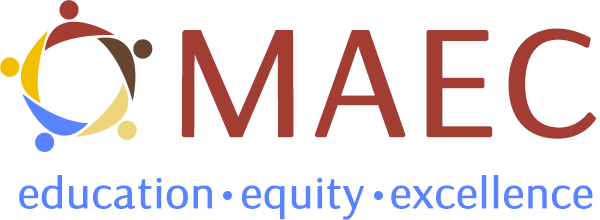MAEC Internship – Jennifer Wu-Pope

Meet Jennifer Wu-Pope, Data and Evaluation Intern! We have been lucky to have a thriving internship program with dedicated, enthusiastic interns who share our passion for education equity. We recently sat down with Jennifer to learn more about her commitment to education equity and her highlights as an intern at MAEC.
Tell us about yourself!
I have been a teacher for over a decade, with experience teaching world languages and English as a New Language. I currently teach middle school and high school students, but previously I have also taught elementary school students and adult learners. Being a student, teacher, and lifelong learner has allowed me to participate in and observe a wide range of educational systems. I have visited and studied in a variety of educational institutions across the United States and in Finland, France, China, and Singapore.
Why do you choose to work in education equity?
I know from my personal and professional experiences that education is a social benefit where there is varied access to develop the skills and competencies for career and for participation in society.
As an educator, I have seen the effects of inequity on the students entering my classes. Working toward education equity is a concrete objective for me: I can picture the faces of my students who would benefit from systemwide improvements in educational equity.
On a personal level, I was fortunate to have had access to quality public education. As a first-generation college graduate, I had to find my own way through the higher education journey, but there were fortuitous supports for me along that path. When I became an educator, I better understood the factors that contribute to a high-quality educational experience and saw the inequitable distribution of those factors across schools.
What does education equity mean to you?
Nelson Mandela once said, “Education is the most powerful weapon which you can use to change the world.” It wields the potency to effect change across people and systems and an ability to empower at an individual, internal level. Education can open new doors, whether it is learning to persist in problem solving or acquiring a new skill in an adult education program. To me, education equity means equitable access to those doors.
In Pedagogy of the Oppressed, Paolo Freire described the banking model of education, whereby discrete bits of information are deposited into pupils’ minds. Education equity is a contrast to this bleak picture of the banking model, instead connecting students to learning to prepare them for fulfilling careers and meaningful participation in society, as well as building a foundation to continue learning into adulthood. I believe all students should have access to a quality education and to educators who care.
What do you do as an intern at MAEC?
I supported the MAEC Data and Evaluation team on a variety of projects, including the Montgomery County Public Schools Antiracist System Audit, the Burlington Schools report, and the Baltimore Summer Funding Collaborative. I participated in various capacities, such as coding qualitative data, contributing to literature reviews, translating comments from French and Chinese to English, working on survey comment syntheses, and providing additional feedback on report drafts.
What has been a highlight of your experience at MAEC so far?
The first highlight has been the opportunity to work with the talented, dedicated, and inspiring team at MAEC. Although my work has been entirely remote, I have been impressed by the kindness and care of the people I have worked with. I have also learned so much from the diverse perspectives and skills of the team at MAEC.
The second highlight has been the knowledge and inspiration that I have gleaned from the projects themselves. The coding of hundreds of open-ended survey comments from students allowed me to see firsthand what a subset of secondary students are thinking about educational equity and matters of diverse representation. From one of the literature reviews, I learned about participatory grantmaking as a model for increasing voice among those who would be the recipients of grant funding. Both tasks have expanded my views and ideas about the structure of educational experiences and how funding decisions are made.
How do you see this internship factoring into your work after MAEC?
My current goal is to find an integration of education practice, research, and policy. The more I learn about the education landscape, the more I see the interdependence and interconnectedness of the system’s components. The experiences at MAEC equip me to work in education policy more effectively, particularly with a focus on equity.

